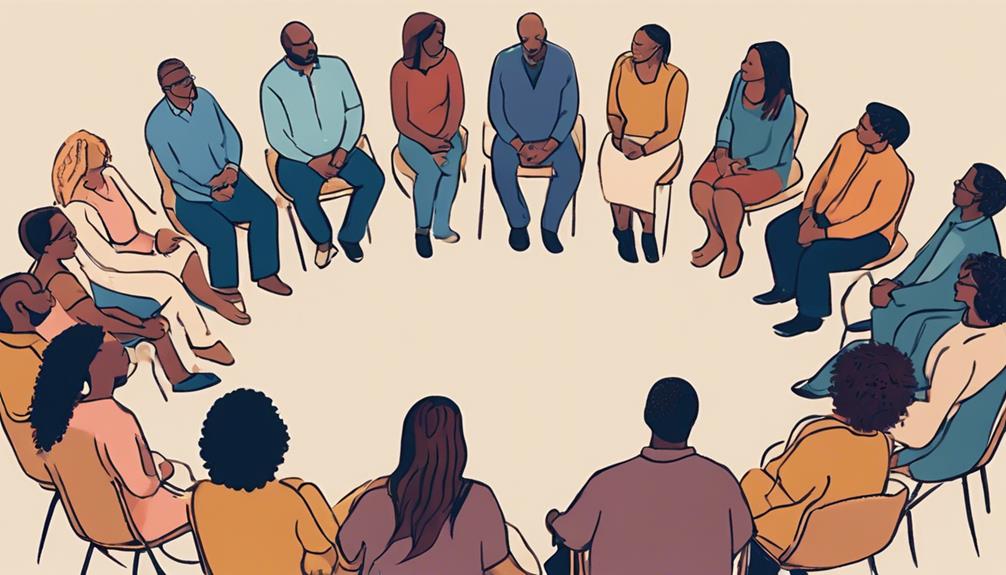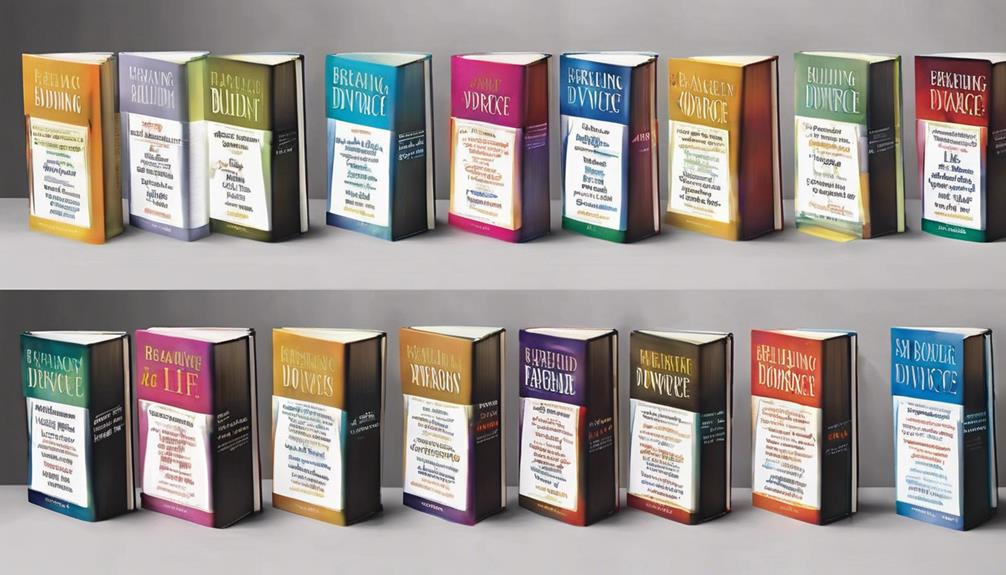Life After Divorce
Understanding Remarriage After Divorce Law

Were you aware that around 40-50% of marriages in the United States result in divorce? As remarriage becomes more prevalent, it’s critical to grasp the legal implications associated with embarking on a new phase of your life.
Remarrying individuals must navigate a complex web of legalities that can impact their rights and responsibilities. From child support and alimony agreements to the legal status of step-parents and Social Security benefits, being aware of the laws surrounding remarriage after divorce is crucial.
In this article, we’ll explore the various legal considerations that individuals should keep in mind when entering into a remarriage after divorce. We’ll delve into key topics such as child support obligations, the impact of remarriage on alimony agreements, the legal status of step-parents, Social Security benefits, prenuptial agreements, estate planning, and even biblical perspectives on remarriage.
Key Takeaways
- Remarriage generally does not affect child support obligations.
- The impact of remarriage on alimony agreements varies depending on state laws and the specific terms of the support agreement.
- Remarriage does not automatically affect the legal status of a child’s parents or guardians.
- Remarriage terminates Social Security benefits under an ex-spouse’s record, but survivors’ benefits may still be retained under certain conditions.
- Prenuptial agreements and estate planning documents can provide added protection and clarity for individuals entering into a remarriage.
Now, let’s dive deeper into the legalities surrounding remarriage after divorce and equip you with the knowledge you need to make informed decisions.
Child Support Obligations in Remarriage After Divorce
When it comes to remarriage after divorce, many individuals have concerns about how it may affect their child support obligations. However, it’s important to understand that remarriage generally does not impact child support in the eyes of the law.
Child support is primarily determined based on the parents’ income, as well as other factors such as the needs of the child and the parenting arrangement. The remarriage of either parent typically does not impact the amount of child support that is ordered by the court. The purpose of child support is to ensure the well-being and financial support of the child, regardless of the marital status or remarriage of the parents.
It’s worth noting that in some cases, a new spouse’s income may be considered when determining child support if they have a legal obligation to support the child. This can occur when a new spouse adopts the child or when there are extraordinary circumstances that warrant the inclusion of their income in the child support calculation. However, these situations are not common and depend on specific legal circumstances.
In summary, parents who are considering remarriage can generally rest assured that their child support obligations will remain intact. The court’s primary focus is to ensure that the child’s best interests are met, regardless of the parents’ marital status or remarriage.
“Remarriage generally does not affect child support obligations. The amount of child support is determined based on the parents’ income and other factors, and it is typically not affected by the remarriage of either parent.”
Impact of Remarriage on Alimony Agreements
When considering remarriage after divorce, it’s important to understand how it may impact alimony agreements, also known as spousal support. The impact of remarriage on alimony can vary depending on the specific terms of the support agreement and the divorce laws in your state.
Some alimony agreements directly address the issue of remarriage and specify whether the support amount will change or terminate upon remarriage. In these cases, the agreement will outline whether alimony payments should continue, decrease, or cease altogether once the recipient remarries. A clear provision in the agreement can help eliminate any ambiguity and provide clarity for both parties involved.
In some states, there are laws that allow for modification or termination of alimony upon remarriage. This means that if the paying ex-spouse can prove that the recipient has remarried, they may be able to petition the court to modify or terminate the support obligation. However, it’s important to note that not all states have this provision, so it’s crucial to consult with a divorce attorney familiar with your state’s laws.
On the other hand, if the original alimony agreement contains a provision that explicitly states alimony cannot be changed, it is unlikely that remarriage will have any effect on the support amount. These provisions are often included to provide financial security and stability to the recipient, regardless of their marital status following the divorce.
It’s worth noting that the remarriage of a paying ex-spouse is even less likely to impact alimony obligations. The primary focus of alimony is to provide financial support to the recipient, and the remarriage of the payer does not typically affect their ability to fulfill their obligations under the agreement.
It’s important to consult with a family law attorney to fully understand how remarriage may impact your specific alimony agreement and legal rights. They can guide you through the process, provide advice tailored to your unique situation, and ensure that your interests are protected.

| Impact of Remarriage on Alimony Agreements | Effect on Alimony |
|---|---|
| If alimony agreement addresses remarriage explicitly | May change or terminate alimony based on agreement |
| If state law allows modification or termination of alimony upon remarriage | Paying ex-spouse may petition the court for changes |
| If alimony agreement states alimony cannot be changed | Remarriage is unlikely to affect support amount |
| If paying ex-spouse remarries | Remarriage typically does not impact alimony obligations |
Legal Status of Step-Parents After Remarriage
Remarriage on its own does not affect the legal status of a child’s parents or guardians. However, a step-parent can play an influential role in the child’s life and assume certain parental responsibilities. To establish legal rights and responsibilities for the child, the step-parent may need to pursue stepparent adoption.
Stepparent adoption typically requires the consent of both legal parents and may result in the termination of the other parent’s rights and potentially their child support obligations. It provides the step-parent with legal recognition and obligations towards the child.
Without stepparent adoption, a new spouse does not have legal obligations towards the child in the case of divorce. While they may have formed a close relationship with the child and assumed a parental role, their legal rights and responsibilities may be limited.
Stepparent adoption offers a way to legally solidify the bond between the step-parent and the child, providing stability and clarity in the event of a marital breakdown.
Benefits of Stepparent Adoption:
- Legal recognition: Stepparent adoption grants the step-parent legal rights and responsibilities towards the child.
- Emotional security: Adoption can solidify the family unit and provide emotional security for the child.
- Financial obligations: In some cases, stepparent adoption may relieve the other biological parent of their child support obligations.
- Inheritance rights: Adoption can ensure that the child has inheritance rights and equal treatment within the family.
A stepparent adoption can be a complex legal process that varies by jurisdiction. It is crucial to consult with a family law attorney who specializes in adoption to navigate the requirements and complete the necessary paperwork.

| Benefits of Stepparent Adoption | Description |
|---|---|
| Legal recognition | Stepparent adoption grants the step-parent legal rights and responsibilities towards the child. |
| Emotional security | Adoption can solidify the family unit and provide emotional security for the child. |
| Financial obligations | In some cases, stepparent adoption may relieve the other biological parent of their child support obligations. |
| Inheritance rights | Adoption can ensure that the child has inheritance rights and equal treatment within the family. |
Impact of Remarriage on Social Security Benefits
Remarrying after divorce can have significant implications for Social Security benefits. When individuals remarry, their ability to receive benefits based on their ex-spouse’s record is terminated. However, certain conditions allow individuals to retain survivors’ benefits even after remarriage.
Generally, individuals eligible for Social Security survivors’ benefits must be 60 years or older to remarry without losing those benefits. There are exceptions for individuals with disabilities, who may retain their survivors’ benefits if they remarry at age 50 or older.
Upon reaching the age of 62, individuals have the option to choose between receiving their new spouse’s retirement benefits or the survivors’ benefits.
Impact on Social Security Benefits
Remarrying after divorce removes an individual’s eligibility to receive Social Security benefits under their ex-spouse’s record. This means that they will no longer receive retirement, disability, or spousal benefits based on their former partner’s work history.
However, remarriage does not affect an individual’s ability to receive survivors’ benefits under certain circumstances. Survivors’ benefits may still be retained if the individual meets the age requirements outlined above.
It’s important to consider the impact that remarriage may have on Social Security benefits when planning for a future together. Understanding these factors can help remarried individuals make informed decisions about their financial security and retirement planning.

Social Security Benefit Eligibility Based on Remarriage
| Remarriage Age | Eligibility for Social Security Survivors’ Benefits |
|---|---|
| 60 and above | Retain survivors’ benefits after remarriage |
| 50 and above (with disabilities) | Retain survivors’ benefits after remarriage |
| 62 and above | Choice between new spouse’s retirement benefits or survivors’ benefits |
Importance of Prenuptial Agreements in Remarriage
Prenuptial agreements play a vital role in protecting individuals entering into a remarriage, especially those with significant assets to safeguard, such as homes, retirement accounts, and businesses. A prenuptial agreement allows individuals to address potential areas of contention and establish provisions for the division of assets and responsibilities in the event of divorce. Remarrying individuals who have children from a previous marriage may also use prenuptial agreements to protect their children’s inheritance and provide for their well-being.
“A prenuptial agreement can be an important tool to ensure that both parties are protected and that their rights and assets are clearly defined. It allows couples to have open and honest conversations about their financial expectations and take steps to preserve their individual and shared interests.”
By addressing potential disputes about property division, spousal support, and other financial matters upfront, prenuptial agreements can help avoid lengthy and costly legal battles in the future. It provides clarity and security for both parties, reducing the stress and uncertainty often associated with divorce proceedings.
Benefits of Prenuptial Agreements in Remarriage:
- Protection of assets acquired before the remarriage
- Clarity in property division and distribution
- Legal protection for businesses and investments
- Preservation of inheritance rights for children from previous marriages
- Establishment of financial obligations and responsibilities
- Prevention of disputes and potential legal battles in the event of divorce
When creating a prenuptial agreement, it is essential to work with a qualified family law attorney to ensure that the agreement is valid and enforceable. Both parties should have independent legal counsel to protect their individual interests and ensure that the agreement accurately reflects their intentions and desires.
| Assets | Allocation in Prenuptial Agreement |
|---|---|
| Homes | Spouse A retains ownership of the marital home in the event of divorce. |
| Retirement Accounts | Spouse B is entitled to 50% of the retirement accounts accumulated during the marriage. |
| Businesses | Spouse A’s business remains separate property and is not subject to division in divorce. |
| Investments | Investments held before the marriage are to be retained by the original owner. |
Remember, a prenuptial agreement does not anticipate divorce, but rather serves as a proactive measure to protect each party’s interests in the unfortunate event of a separation. Open and honest communication is paramount during the creation of a prenuptial agreement, as it allows both parties to fully understand and express their expectations for the marriage.

Estate Planning Considerations in Remarriage
When entering into a remarriage, it is important to consider estate planning alongside prenuptial agreements. Estate planning documents such as wills, trusts, and insurance policies play a crucial role in addressing the needs of individuals and their loved ones, particularly in the context of remarriage.
By creating a comprehensive estate plan, individuals can ensure that their assets are distributed according to their wishes and that their loved ones are taken care of, including children from a previous marriage.
Protecting Your Assets
An estate plan allows you to protect your assets and establish a clear plan for their distribution in the event of divorce or death. By outlining your intentions in legally binding documents, you can provide for your family’s financial security and minimize potential conflicts or complexities that may arise.
Caring for Children from Previous Marriages
One significant consideration in estate planning after remarriage is ensuring that children from a previous marriage are provided for. By including specific provisions and instructions in your estate plan, you can ensure that your children receive their intended inheritance and that their well-being is protected.
Addressing Potential Challenges
Divorce and remarriage can introduce unique challenges and complexities when it comes to estate planning. By working with an experienced estate planning attorney, you can navigate these challenges and develop a plan that addresses your specific needs and circumstances.
“An estate plan is like a roadmap that guides the distribution of your assets and ensures that your loved ones are taken care of even if circumstances change.” – John Adams, Estate Planning Attorney
Prenuptial Agreements and Estate Planning
Prenuptial agreements can work in tandem with estate planning to provide added protection and clarity in the event of divorce or death. By outlining the division of assets and the handling of financial matters in advance, prenuptial agreements can help avoid conflicts and smooth the process for all parties involved.
It is essential to consult with both an estate planning attorney and a family law attorney to ensure that your prenuptial agreement and estate plan work together seamlessly.

Biblical Perspectives on Remarriage After Divorce
Biblical perspectives on remarriage after divorce vary depending on interpretation. While the Bible emphasizes the sanctity of marriage and discourages divorce, it acknowledges that divorce may occur due to the hardness of human hearts. Different passages in the Bible address the grounds for divorce and the possibility of remarriage, primarily in cases of sexual immorality or abandonment by an unbelieving spouse. However, the interpretation of these passages and the permissibility of remarriage after divorce remain subjects of debate among scholars and religious denominations.
Church Discipline and Remarriage After Divorce
Divorce is a complex and sensitive issue within religious communities, including the church. When divorce occurs for reasons deemed unbiblical, believers may be subject to church discipline as they are seen to reject the teachings of God. Such discipline aims to guide individuals in understanding their situation biblically and reconciling their actions with their faith.
According to the Bible, church discipline in the context of divorce involves the reclassification of the disobedient spouse as an “outcast” or unbeliever. This reclassification allows the innocent party to pursue divorce according to the provision found in 1 Corinthians 7:15, which permits divorce in cases of an unbelieving spouse leaving.
The role of church leadership is crucial in providing guidance and clarification for individuals who have been divorced. They play a supportive and educational role in helping divorced individuals navigate the complexities of remarriage and align their actions with their faith. By offering biblical interpretations and pastoral care, church leaders assist individuals in finding spiritual healing and understanding.
Quotes:
“The church aims to guide believers towards reconciliation and a deeper understanding of God’s teachings, even in the difficult context of remarriage after divorce.” – Pastor Sarah Johnson
Key Points:
- Church discipline may be applied to believers who divorce for unbiblical reasons.
- Divorced individuals may be deemed as “outcasts” or unbelievers, allowing the innocent party to pursue divorce.
- Church leadership provides guidance and clarification on remarriage within a biblical context.
- Church discipline aims to promote healing and reconciliation in the lives of those affected by divorce.
| Pros | Cons |
|---|---|
| Offers spiritual guidance and support for individuals navigating remarriage after divorce. | May lead to feelings of exclusion or judgment for those undergoing church discipline. |
| Helps individuals align their actions with their faith and find healing in the midst of divorce and remarriage. | May create tension or conflict within religious communities that hold differing views on divorce and remarriage. |
| Encourages a deeper understanding of biblical teachings on divorce and remarriage. | May deter individuals from seeking remarriage due to the fear of church discipline. |
Repentance, forgiveness, and Remarriage
The Bible emphasizes the importance of repentance and forgiveness in the context of divorce and remarriage. If a divorce occurred under unbiblical grounds, genuine repentance allows for forgiveness and opens up the possibility of pursuing another relationship. However, it is essential to seek guidance and counsel from church leadership when considering remarriage after divorce.
Please note that while remarriage after divorce may be permitted, it does not necessarily align with God’s desired plan for everyone. Some believers may be called to remain single, devoting their attention solely to their relationship with God and serving His purposes.
Seeking Repentance and Forgiveness
When a divorce occurs, it is crucial to reflect on the circumstances that led to the breakdown of the marriage. Genuine repentance involves acknowledging wrongdoing, seeking forgiveness from God, and making amends where possible. By recognizing one’s mistakes and taking steps to rectify them, individuals can experience healing and restoration in their lives.
“If we confess our sins, he is faithful and just and will forgive us our sins and purify us from all unrighteousness.” – 1 John 1:9
Guidance from Church Leadership
Seeking guidance from church leadership is essential when considering remarriage after divorce. Church leaders can provide wisdom, biblical insights, and support during this decision-making process. They can help individuals navigate the complexities of divorce, understand biblical principles, and discern whether remarriage is the right path for them.
God’s Plan for Individuals
It is essential to remember that God has a unique plan for each individual. While some may find healing and a new chapter in remarriage, others may be called to remain single and focus on their relationship with God. By seeking His guidance and surrendering to His will, individuals can find peace and fulfillment in their circumstances.
It is important to approach remarriage after divorce with a prayerful heart, seeking God’s wisdom and guidance throughout the process.
| Remarriage after Divorce | Key Points |
|---|---|
| Definition | Entering into a new marriage after the dissolution of a previous marriage. |
| Biblical Perspective | The Bible allows for remarriage after divorce on grounds of sexual immorality or abandonment by an unbelieving spouse, but interpretation varies among denominations. |
| Repentance and Forgiveness | Genuine repentance and seeking forgiveness are crucial before considering remarriage. |
| Church Guidance | Seeking guidance from church leadership is essential when making the decision to remarry. |
| God’s Plan | It is important to discern God’s plan for one’s life, as not everyone is called to remarry after divorce. |
Conclusion
Remarriage after divorce entails important legal considerations that individuals must take into account. Understanding the divorce laws and regulations specific to your jurisdiction is crucial before entering into a remarriage. Every aspect, such as child support, alimony agreements, social security benefits, and estate planning, requires careful attention to ensure a smooth transition into the next chapter of your life.
Moreover, contemplating biblical perspectives and seeking guidance from church leadership can provide valuable insights and clarity. It is essential to align your decisions with your personal beliefs and values, especially in matters as sensitive as remarriage after divorce.
In conclusion, remarriage after divorce demands thoughtful reflection, open communication, and a firm commitment to building a strong foundation for the future. By considering the legal considerations and seeking appropriate guidance, individuals can navigate the complexities of remarriage and ensure a successful and fulfilling union.
Remarriage generally does not affect child support obligations. The amount of child support is determined based on the parents’ income and other factors and is typically not affected by the remarriage of either parent.
The impact of remarriage on alimony agreements can vary depending on the specific terms of the support agreement and state laws. Some alimony agreements may directly address remarriage and specify whether the support amount will change or terminate. However, if the original agreement contains a provision stating that alimony cannot be changed, remarriage is unlikely to affect the support amount. Remarriage on its own does not affect the legal status of a child’s parents or guardians. However, a step-parent can assume a parental role and have a significant influence on the child’s life. To establish legal responsibilities and rights for the child, the step-parent may need to go through the process of stepparent adoption.
Remarriage terminates an individual’s right to receive Social Security benefits under their ex-spouse’s record. However, survivors’ benefits may still be retained after remarriage under certain conditions.
Prenuptial agreements play a vital role in protecting individuals entering into a remarriage, especially those with significant assets to safeguard. They allow individuals to address potential areas of contention and establish provisions for the division of assets and responsibilities in the event of divorce.
Estate planning documents such as wills, trusts, and insurance policies are essential in addressing the needs of individuals entering into a remarriage. They allow individuals to ensure that their assets are distributed according to their wishes and that loved ones outside of their current marriage are taken care of.
Biblical perspectives on remarriage after divorce vary depending on interpretation. The Bible acknowledges that divorce may occur due to the hardness of human hearts and addresses the grounds for divorce and the possibility of remarriage in certain cases, such as sexual immorality or abandonment by an unbelieving spouse. In cases where divorce takes place on unbiblical grounds, believers may be subject to church discipline as they are seen to reject the teachings of God. The process of church discipline outlined in the Bible may involve reclassification of the disobedient spouse as an “outcast” or unbeliever, allowing the innocent party to pursue divorce according to the provision for divorce in cases of an unbeliever departing.
The Bible emphasizes repentance and forgiveness in the context of divorce and remarriage. If a divorce took place on unbiblical grounds, genuine repentance allows for forgiveness and the possibility of pursuing another relationship, under the guidance and counsel of church leadership.
Remarriage after divorce involves various legal considerations, including child support, alimony agreements, social security benefits, and estate planning. Understanding the specific laws and regulations in one’s jurisdiction is crucial for individuals entering into a remarriage.
FAQ
How does remarriage after divorce affect child support obligations?
What is the impact of remarriage on alimony agreements?
How does remarriage affect the legal status of step-parents?
What happens to Social Security benefits after remarriage?
How can prenuptial agreements protect individuals entering into a remarriage?
How do estate planning documents factor into remarriage?
What are the biblical perspectives on remarriage after divorce?
What is the role of church discipline in remarriage after divorce?
How does repentance and forgiveness relate to remarriage after divorce?
What legal considerations should be taken into account for remarriage after divorce?
Source Links
- https://www.gotquestions.org/divorce-remarriage.html
- https://www.gracechurch.org/about/distinctives/divorce-and-remarriage
- https://www.justia.com/family/divorce/after-divorce/remarriage/
Sarah’s voice is one of the first you’ll encounter at How Get Divorce, and it’s one you’ll come to trust. As a writer, she brings relatability and approachability to complex topics, making them understandable for everyone. As our Community Moderator, Sarah fosters a welcoming and supportive environment, encouraging open dialogue and connection among our members. Her ability to relate to others and moderate discussions makes her an integral part of our team and community.
Life After Divorce
What Can You Expect at the Life After Divorce Conference at BYU?
Get ready to uncover the hidden gems of healing and empowerment at the Life After Divorce Conference at BYU – your transformation awaits!

During the Life After Divorce Conference at BYU, we’ve established a foundation for participants to steer through the turbulent waters of life following divorce with confidence.
With a lineup of workshops, panel discussions, and networking opportunities, the conference promises to offer a comprehensive roadmap for those seeking to rebuild their lives after a significant life event.
But what lies beneath the surface of these offerings, and how can they truly impact your journey to a brighter tomorrow?
Key Takeaways
- Workshops on rebuilding self-esteem and co-parenting relationships
- Expert panels offering practical strategies for healing and growth
- Networking opportunities to connect with a supportive community
- Emotional healing sessions and legal/financial guidance available
Workshop Sessions Overview
During the Life After Divorce Conference at BYU, attendees can engage in a variety of workshop sessions aimed at addressing key aspects of post-divorce recovery and growth. These workshops cover essential topics such as rebuilding self-esteem, navigating co-parenting relationships, and finding spiritual strength. Participants will have the opportunity to delve into interactive sessions focusing on emotional healing, achieving financial independence, and fostering personal growth.
Expert presenters will offer valuable insights on coping with loneliness, managing emotions effectively, and establishing new routines post-divorce. The workshops are designed to provide practical tools for setting boundaries, managing stress, and fostering resilience during the healing process. Additionally, attendees can engage in discussions centered around themes like forgiveness, self-discovery, and creating a new vision for life after divorce.
Expert Panel Discussions

Our expert panel discussions feature 2-3 instructors who share valuable insights and expertise on key topics related to post-divorce recovery and growth. These panel discussions provide a platform for an in-depth exploration of various subjects, lasting approximately 40-50 minutes each.
Here's what you can expect from our expert panel discussions:
- Gain diverse perspectives: Our selected panelists bring a range of backgrounds and experiences to the table, offering attendees a broad view of post-divorce challenges and opportunities.
- Practical advice: Panelists offer practical strategies and tips that attendees can implement in their own lives to facilitate healing and growth after divorce.
- Aligned with the conference theme: The topics covered in these discussions directly tie into the conference theme of moving forward after divorce, ensuring that attendees receive focused and relevant information.
- Expertise and insights: Our panelists are carefully chosen based on their educational qualifications, teaching abilities, and faith-centered approach to provide attendees with expert guidance and valuable insights.
Networking Opportunities
Engage with a diverse community of individuals navigating similar life stages to cultivate valuable connections and support networks at the Life After Divorce Conference at BYU.
This conference provides an excellent platform for networking with like-minded individuals who understand the challenges of post-divorce life.
You'll have the opportunity to connect with professionals and experts in the field of post-divorce healing, gaining insights and advice to aid in your journey towards healing and growth.
Emotional Healing Workshops

In the emotional healing workshops at the Life After Divorce Conference at BYU, participants engage in activities designed to address and overcome the emotional impact of divorce. These workshops provide valuable support, guidance, and tools for individuals navigating the post-divorce journey.
Here's what you can expect in these workshops:
- Supportive Environment: The workshops offer a safe space where attendees can openly express their emotions and receive understanding from others facing similar challenges.
- Guidance for Healing: Facilitators lead discussions and activities that help participants process grief, navigate the emotional transition, and find ways to heal from the wounds of divorce.
- Tools for Growth: Attendees gain practical strategies and coping mechanisms to aid in their emotional healing and personal growth after divorce.
- Exploration of Emotions: Through guided exercises, individuals explore their feelings of loss, sadness, and change, fostering a deeper understanding of themselves and their emotional journey.
Legal and Financial Guidance
Legal and financial guidance offered at the Life After Divorce Conference includes sessions on navigating divorce laws, custody arrangements, and post-divorce legal rights. Financial experts will share insights on managing finances after divorce, covering topics such as budgeting, asset division, and financial planning for the future.
Attendees can discover resources for obtaining legal assistance, including pro bono services, legal aid organizations, and mediation options. Workshops will address updating legal documents, understanding alimony and child support, and safeguarding assets during and after divorce.
Practical advice on rebuilding financial stability, creating a post-divorce budget, and setting financial goals will be provided to help attendees navigate their new financial circumstances. The conference aims to equip individuals with the tools and knowledge necessary to achieve financial stability and legal clarity in the aftermath of a divorce.
Frequently Asked Questions
What Does Life Look Like After Divorce?
Life after divorce can be a journey of self-discovery and growth. We navigate through rebuilding self-worth, managing emotions, and seeking support. It's a gradual process, but with perseverance and guidance, we can find healing and renewal.
How Do I Restart My Life After Divorce?
We restart our lives after divorce by embracing self-care, seeking support, and setting new goals. It's essential to focus on healing, finding purpose, and building a supportive community. Take small steps each day towards rebuilding.
How Do You Thrive After Divorce?
We rebuild with courage. We embrace new paths, finding strength in community. We rediscover joy, one step at a time. We learn, grow, and thrive after divorce, claiming a future filled with possibility.
How Do You Start Over After a Seperation?
We start over after a separation by seeking support, creating new routines, setting goals, reflecting on lessons learned, and embracing self-discovery. These steps help us navigate emotional challenges, establish stability, and focus on building a fulfilling life post-separation.
Conclusion
In conclusion, attendees at the Life After Divorce Conference at BYU can expect a plethora of powerful presentations, poignant panels, and priceless connections.
This conference provides a platform for participants to gain practical tools, professional advice, and personal support as they navigate their post-divorce journey.
Join us for a weekend of growth, guidance, and grace as we embark on this transformative experience together.
Maya brings a wealth of experience in providing emotional support to individuals facing life’s challenges. Her contributions to How Get Divorce are characterized by empathy, understanding, and a profound sense of authority on matters of emotional well-being. Maya’s work is dedicated to ensuring that our community feels supported and understood, offering tools and advice to cope with the emotional aspects of divorce.
Life After Divorce
Top 10 Books for Rebuilding Life After Divorce
Embark on a journey of self-discovery after divorce with the top 10 books that offer solace, strength, and invaluable insights, starting with the letter 'A'.

As a group, we frequently don’t recognize the profound effect that divorce has on people, with research indicating that more than 40% of marriages result in divorce. Venturing into the area of recovery after divorce can seem overwhelming, but selecting the appropriate books can light the way through this difficult path.
Each page turned offers a glimpse into the transformative power of healing, growth, and self-discovery. Let's uncover the top 10 books that can illuminate the path to rebuilding a fulfilling life after divorce and provide invaluable insights for those seeking solace and strength in their newfound independence.
Key Takeaways
- Prioritize emotional healing and growth through self-compassion and support.
- Foster personal growth and empowerment by accepting flaws and nurturing resilience.
- Embrace a structured approach post-divorce for mindful healing and growth.
- Cultivate mindfulness and resilience to navigate challenges with clarity and ease.
Healing From Heartbreak
In our journey towards healing from heartbreak, Florence Williams' book 'Heartbreak' stands as a guiding light, offering valuable insights and practical tools for navigating through emotional pain and finding solace. This book is like a Breakup Bible, providing a comprehensive Guide to Healing after a breakup or divorce. Williams delves deep into the complexities of heartbreak, shedding light on the emotional turmoil that follows such experiences. Through her expertise, readers can learn to understand and overcome the intense pain that accompanies the end of a relationship.
One of the key takeaways from 'Heartbreak' is the importance of self-care and self-compassion during times of heartache. Williams emphasizes the need to prioritize one's well-being and mental health as part of the healing process. By offering practical strategies and exercises, this book equips readers with the tools necessary to navigate the challenging journey towards emotional recovery. Through 'Heartbreak,' individuals can find a sense of hope and renewal as they work towards rebuilding their lives after heartbreak.
Embracing Imperfections

Navigating the aftermath of heartbreak, we come to understand that embracing imperfections isn't just a choice but a necessity for rebuilding a fulfilling life after divorce. Embracing imperfections involves accepting flaws and mistakes as part of personal growth. It's about learning to love oneself despite imperfections, fostering resilience, and inner strength. This journey encourages a mindset shift towards self-compassion and authenticity.
- Accepting flaws and mistakes as opportunities for growth
- Learning to love oneself despite imperfections
- Fostering resilience and inner strength through self-compassion
- Encouraging a shift towards authenticity and self-acceptance
Embracing imperfections allows us to appreciate the beauty of our unique journey, recognizing that self-compassion is the cornerstone of rebuilding our lives after divorce. By embracing our imperfections, we pave the way for genuine growth and a more fulfilling future.
Finding Strength in Adversity
Finding strength in adversity requires a deep-rooted belief in our resilience and a willingness to confront challenges head-on. Separation and divorce can be emotionally draining, but it is essential to remember that difficult times can lead to personal growth and empowerment. Breakup expert Rachel Sussman emphasizes the importance of finding inner strength during such trying times. Here are some key points to keep in mind:
| Key Point | Description |
|---|---|
| Embrace Vulnerability | Acknowledge your feelings and allow yourself to be vulnerable; it's okay not to be okay. |
| Seek Support | Surround yourself with a supportive network of friends, family, or a therapist for guidance. |
| Practice Self-Compassion | Treat yourself with kindness and understanding; self-compassion is crucial for healing. |
| Focus on Resilience | Cultivate a mindset that focuses on bouncing back stronger from setbacks and challenges. |
| Find Meaning in Adversity | Look for lessons in the hardships you face; every struggle can offer an opportunity for growth. |
Conscious Uncoupling Guide

Embracing the concept of 'Conscious Uncoupling' can provide valuable insights and practical tools for navigating the challenges of post-divorce life in a more intentional and growth-oriented manner. This guide by Katherine Woodward Thomas offers a structured approach to transitioning positively after a breakup or divorce. Here are some key takeaways from the 'Conscious Uncoupling' guide:
- Five-step Process: The book presents a clear and actionable five-step process to help individuals navigate the complexities of divorce with mindfulness and grace.
- Practical Tools: Katherine Woodward Thomas equips readers with practical tools that can be applied in real-life situations to foster healing and growth post-divorce.
- Focus on Personal Growth: 'Conscious Uncoupling' emphasizes the importance of personal growth and well-being, encouraging individuals to create a fulfilling life even after separation.
- Intentional Uncoupling: This guide promotes conscious and intentional ways to uncouple, fostering a sense of empowerment and self-awareness during the divorce process.
Practicing Mindfulness Daily
Let's explore the powerful impact of practicing mindfulness every day.
By incorporating mindfulness into our daily routine, we can effectively reduce stress, anxiety, and depression, paving the way for a more balanced and peaceful life.
This practice can sharpen our focus, enhance memory, and equip us with better emotional regulation skills.
Benefits of Mindfulness
Practicing mindfulness daily offers a powerful tool for reducing stress, anxiety, and depression while enhancing emotional well-being and cognitive function. By incorporating mindfulness into our daily routines, we can experience a range of benefits that positively impact various aspects of our lives.
Consider the following:
- Mindfulness helps us stay grounded in the present moment, fostering a sense of peace and clarity.
- It enhances our ability to manage difficult emotions, leading to improved emotional regulation.
- Mindfulness can strengthen our relationships by increasing empathy and promoting better communication.
- Regular practice of mindfulness boosts resilience, empowering us to navigate life's challenges with greater ease and composure.
Techniques for Mindfulness
When incorporating mindfulness into our daily routines, focusing on the present moment without judgment can significantly enhance our self-awareness and clarity. Mindfulness techniques, such as deep breathing and body scans, offer practical ways to cultivate inner peace and reduce stress.
By daring greatly and embracing these practices, we can positively impact our emotional well-being and cognitive function. It's important to acknowledge the truth about children and how they can benefit from mindfulness practices too. Engaging in mindful activities like mindful walking not only fosters a sense of calm within ourselves but also sets an example for our children, teaching them valuable tools for managing their emotions.
Let's commit to daily mindfulness practice for our well-being and the well-being of those around us.
Breaking Free From Codependency

We understand the struggle of breaking free from codependency after a divorce.
Identifying codependency patterns, setting healthy boundaries, and focusing on individual growth are crucial steps towards healing.
Codependency Patterns Identification
In identifying codependency patterns for breaking free from codependency, recognizing behaviors like people-pleasing, low self-esteem, and difficulty setting boundaries is crucial. Understanding these patterns can empower individuals to make positive changes in their relationships.
- People-pleasing tendencies can lead to neglecting one's own needs.
- Low self-esteem may result in seeking validation and approval from others.
- Difficulty setting boundaries can result in overextending oneself and feeling overwhelmed.
- Enabling behaviors often perpetuate unhealthy relationship dynamics.
Building Healthy Boundaries
Recognizing and understanding codependency patterns is the first step towards building healthy boundaries and breaking free from toxic relationship dynamics. New Life after divorce involves setting boundaries that prioritize self-care and self-respect. By establishing limits, we create space for personal growth and balanced relationships. Breaking free from codependency requires self-awareness and empowerment to overcome the habit of sacrificing our needs for others. Healthy boundaries are essential for fostering mutual respect and emotional well-being. Embracing this journey of self-discovery can lead to a fulfilling life post-divorce, where we learn to value ourselves and our needs. Let's take a practical step towards building healthier relationships by setting boundaries that honor our worth.
| Building Healthy Boundaries | Breaking Free From Codependency |
|---|---|
| Establish limits for self-care | Overcome the habit of sacrifice |
| Prioritize self-respect | Foster mutual respect |
| Create space for growth | Cultivate self-awareness |
| Ensure emotional well-being | Empower yourself |
Seeking Individual Growth
Breaking free from codependency involves embracing personal growth and self-empowerment to establish healthier boundaries and cultivate a fulfilling life post-divorce. 'Co-Dependent No More' by Melody Beattie offers valuable insights and strategies for individuals looking to break free from codependency patterns. Through self-reliance and introspection, one can pave the way towards a more empowered and fulfilling existence.
Embracing individual growth post-divorce entails a journey of self-discovery, healing, and transformation. By delving into resources like 'Co-Dependent No More,' individuals can embark on a path towards reclaiming their sense of self-worth and creating healthier relationships.
- Embrace personal growth and self-empowerment
- Establish healthier boundaries post-divorce
- Overcome codependent patterns through introspection
- Cultivate a fulfilling and empowered existence
Embracing Your Inner Greatness

To truly rebuild after divorce, we must embrace the inner greatness that resides within us. It is essential to recognize our worth and potential in order to embark on a journey of personal growth and healing. Embracing self-empowerment and self-love are fundamental aspects of rebuilding after divorce. By embracing our strengths and uniqueness, we can not only survive but thrive after a breakup. Cultivating a positive self-image and mindset is crucial for laying the foundation of a fulfilling post-divorce life.
| Embracing Your Inner Greatness | |
|---|---|
| Key Points | |
| Recognize your worth | Cultivate self-empowerment |
| Embrace your strengths | Practice self-love |
| Acknowledge your potential | Foster a positive self-image |
| Embrace your uniqueness | Cultivate a positive mindset |
| Focus on personal growth | Thrive post-divorce |
Making Decisions for Your Future

When making decisions for your future after divorce, consider the well-being and stability of your children as a top priority. It's essential to take the first step with their best interests in mind to set your life back on track. Here are some crucial considerations to help guide your decision-making process:
- Decide on Co-Parenting Arrangements: Creating a solid co-parenting plan can positively impact your children's well-being and provide them with stability.
- Understand Legal Options: Exploring methods like mediation or collaborative divorce can lead to more amicable and cost-effective settlements, reducing stress for all involved.
- Embrace Emotional Healing: Seek support through therapy or support groups to process the emotional challenges and grief associated with divorce, paving the way for a healthier future.
- Plan for Financial Security: Prioritize financial independence and security by carefully planning your finances, ensuring a stable foundation for you and your children.
Taking these steps can lay a strong foundation for rebuilding your life after divorce and setting a positive path forward.
Nurturing Yourself and Your Kids

As we focus on nurturing ourselves and our kids post-divorce, it's crucial to prioritize emotional healing and growth through self-care practices and creating a supportive environment.
Taking time for self-care, such as mindfulness exercises, therapy sessions, journaling, or engaging in hobbies, can help us cope with the emotional challenges that come with divorce. By prioritizing our well-being, we can model resilience for our children and create a nurturing environment that supports their healing process.
Building a strong support system, setting boundaries, and seeking professional help when needed are essential components of post-divorce nurturing. Encouraging open communication, expressing emotions, and fostering a positive environment can aid in the healing process for both ourselves and our children.
Journey to Emotional Healing

As we embark on the journey to emotional healing after divorce, we understand the importance of taking small steps towards healing.
These books guide us through the healing process steps, exploring coping mechanisms that can support us during this challenging time.
They offer opportunities for self-discovery and growth as we navigate the complexities of post-divorce emotions.
Healing Process Steps
Navigating the journey to emotional healing after divorce involves understanding and actively engaging in the essential steps of the healing process. Here are some key steps to aid in your emotional recovery:
- Acknowledge and process emotions: Allow yourself to feel and express the range of emotions that come with divorce.
- Seek support: Reach out to friends, family, or professionals to provide guidance and a listening ear.
- Engage in self-care: Prioritize activities that promote your well-being, such as exercise, hobbies, or relaxation techniques.
- Set boundaries and practice self-compassion: Establish healthy boundaries with others and be kind to yourself throughout this healing process.
Coping Mechanisms Explored
Exploring various coping mechanisms is vital on the journey to emotional healing and recovery after divorce. During this challenging time, turning to resources like Ted Talks can provide valuable insights and inspiration. These talks often cover topics related to emotional healing, offering practical strategies for coping with grief and rebuilding one's life.
Self-Discovery and Growth
Embarking on a journey of self-discovery and growth after divorce is a crucial step towards emotional healing and personal transformation. This path of self-exploration can be both enlightening and empowering, guiding individuals towards a deeper understanding of themselves and their relationships.
Here are some key aspects to consider in this journey:
- Reflecting on past experiences: Taking time to reflect on past relationships and personal choices can provide valuable insights for growth.
- Building resilience: Engaging in self-discovery post-divorce can help nurture resilience and inner strength.
- Exploring new possibilities: Embracing personal growth opens doors to new opportunities and a renewed sense of purpose.
- Finding inner peace: Through self-discovery and growth, individuals can cultivate inner peace and a positive outlook on life.
Frequently Asked Questions
How Do I Restart My Life After Divorce?
We restart after divorce by focusing on self-reflection, healing, and setting new goals. Embrace change, build a support system, and seek professional help. Be patient, practice self-care, and stay positive. Small steps lead to healing and rebuilding life.
What Book to Read After Divorce?
When rebuilding after divorce, finding the right book is key. It can provide solace, guidance, and inspiration. Look for titles that resonate with your journey, offering tools for healing, growth, and a fresh start.
How Do You Start Healing After a Divorce?
We start healing after divorce by acknowledging our emotions, seeking support, engaging in self-care activities, creating new routines, and reflecting on lessons learned. It's a journey of self-discovery and growth that we navigate with compassion and resilience.
How Do I Rebuild My Life After Divorce at 50?
We can rebuild life after divorce at 50 by rediscovering ourselves, creating new routines, seeking support, exploring hobbies, setting goals, and focusing on self-care. It's about finding empowerment and purpose in this new chapter.
Conclusion
As we embark on our journey of rebuilding after divorce, remember that we're like a phoenix rising from the ashes – stronger, wiser, and more resilient than before.
Let these books be our guiding light, illuminating the path towards healing, self-discovery, and empowerment.
With each page turned, may we find the courage to embrace our imperfections, nurture ourselves and our loved ones, and create a future filled with hope and possibility.
Maya brings a wealth of experience in providing emotional support to individuals facing life’s challenges. Her contributions to How Get Divorce are characterized by empathy, understanding, and a profound sense of authority on matters of emotional well-being. Maya’s work is dedicated to ensuring that our community feels supported and understood, offering tools and advice to cope with the emotional aspects of divorce.
Life After Divorce
Embracing Your New Life After Divorce: 3 Essential Steps
Discover the transformative journey of emotional healing, support, and independence after divorce, setting the stage for a new chapter filled with possibilities.

As we begin the journey of adjusting to our new life post-divorce, we encounter the crucial challenge of emotional recovery, creating a network of support, and regaining our autonomy.
These steps serve as crucial pillars in the process of rebuilding and moving forward after a significant life transition. By exploring these essential elements, we can lay a strong foundation for a fulfilling and empowered future.
The road ahead may seem daunting, but with the right strategies in place, we can navigate this transformative period with grace and resilience.
Key Takeaways
- Rediscover past passions to reignite purpose and personal growth.
- Build a strong support system for guidance and emotional healing.
- Embrace newfound independence for self-discovery and happiness.
- Navigate post-divorce challenges with resilience, confidence, and a positive mindset.
Embracing Change With Resilience
Embracing change with resilience after a divorce can be a transformative journey towards a brighter and more fulfilling future. It's natural to feel overwhelmed by the emotional upheaval that comes with the end of a marriage, but it's important to remember that resilience lies within each of us. By tapping into this inner strength, we can navigate the turbulent waters of post-divorce life with grace and determination. This journey isn't just about moving on; it's about harnessing the power of change to propel us towards personal growth and self-discovery.
As we embrace our newfound independence and self-sufficiency, we open ourselves up to a world of possibilities. The path to happiness may be challenging, but it's paved with opportunities for positive change and new beginnings. Our capacity for change is far greater than we often realize, and through emotional healing, we can emerge from the ashes of heartbreak stronger and more resilient than ever before. Let's walk this path together, supporting one another as we embark on this journey towards a brighter tomorrow.
Cultivating Self-Discovery and Growth

In the journey towards self-discovery and growth after divorce, exploring new interests can be a powerful catalyst for personal transformation. It's a time to delve into the depths of our being, redefining our identities and embracing a new chapter with resilience. Here are three essential steps to cultivate self-discovery and growth:
- Rediscover Your Passions: Take the time to explore hobbies or activities that once brought you joy. Reconnecting with these interests can reignite a sense of purpose and help you rediscover aspects of yourself that may have been overshadowed during your marriage.
- Reflect on Your Desires: Dive deep into your innermost desires and preferences. Understanding what truly brings you fulfillment can guide you towards a path that aligns with your authentic self, fostering personal growth and a stronger sense of identity.
- Build Self-Confidence: Engaging in new experiences and stepping out of your comfort zone can boost your self-confidence. Embracing challenges with courage won't only enhance your resilience but also empower you to navigate this new phase of life with renewed strength and conviction.
Navigating Unknown Terrain With Confidence
Navigating unknown terrain after divorce requires us to embrace change with a positive outlook and a readiness to explore new horizons. It's natural to feel uncertain and apprehensive about what lies ahead, but approaching this phase with confidence and resilience is essential for personal growth and empowerment. Confidence in our abilities to adapt to new circumstances will be our guiding light as we carve out a new path for ourselves. By being open to new experiences and opportunities, we can create a fulfilling and rewarding life post-divorce.
| Confidence | Resilience | Positive Mindset |
|---|---|---|
| Believe in yourself and your decisions | Stay strong in the face of challenges | Focus on the good in every situation |
| Trust your instincts | Learn from setbacks and bounce back | Cultivate a hopeful outlook on the future |
| Embrace your strengths | Practice self-care to recharge | Surround yourself with positivity |
Navigating unknown terrain with confidence is a journey of self-discovery and empowerment, paving the way for a fulfilling new life.
Frequently Asked Questions
What Are the Stages of Healing From Divorce?
Navigating healing post-divorce involves acknowledging stages like denial, anger, bargaining, depression, and acceptance. Each emotion is valid and crucial for moving forward positively. Embracing these stages leads to growth and a brighter future.
How Do I Restart My Life After Divorce?
Starting anew after divorce involves self-discovery, healing, and growth. We find solace in reflection, seek support from loved ones, and set positive goals. It's a journey of rediscovery and empowerment, embracing a brighter future together.
What Is the Hoe Phase After Divorce?
Exploring the 'hoe phase' after divorce is about self-discovery and embracing freedom. It allows us to prioritize our needs, rediscover our identity, and reclaim personal agency. It's a period of empowerment and new experiences.
How Do You Get Emotionally Through a Divorce?
We navigate the emotional journey of divorce by allowing ourselves to feel a range of emotions, seeking support from loved ones or professionals, and giving ourselves the time and space needed to heal. It's a process, but we'll get through it together.
Conclusion
As we journey through the rollercoaster of post-divorce life, remember that you aren't alone.
Did you know that 73% of individuals report feeling a sense of relief after finalizing their divorce?
Embrace change with resilience, cultivate self-discovery and growth, and navigate unknown terrain with confidence.
You have the strength within you to create a new life filled with happiness and fulfillment.
Keep moving forward, one step at a time.
Maya brings a wealth of experience in providing emotional support to individuals facing life’s challenges. Her contributions to How Get Divorce are characterized by empathy, understanding, and a profound sense of authority on matters of emotional well-being. Maya’s work is dedicated to ensuring that our community feels supported and understood, offering tools and advice to cope with the emotional aspects of divorce.
-

 Navigating the Divorce Process2 months ago
Navigating the Divorce Process2 months agoNavigating the Complexity: Divorce Document Preparation Services Explained
-

 Life After Divorce2 months ago
Life After Divorce2 months agoTD Jakes: Life After Divorce – A Journey of Healing
-

 Financial Aspects2 months ago
Financial Aspects2 months agoFinancial Advisor's Guide to Navigating Divorce Finances
-

 Supporting Children Through Divorce2 months ago
Supporting Children Through Divorce2 months agoPositive Effects of Divorce on Children: A Guide to Understanding
-

 Navigating the Divorce Process2 months ago
Navigating the Divorce Process2 months agoDivorce Lawyers New Orleans: Your Ultimate Guide to Legal Separation and Family Law
-

 Navigating the Divorce Process2 months ago
Navigating the Divorce Process2 months agoNavigating Divorce with a Muslim Divorce Lawyer
-

 Directory2 months ago
Directory2 months agoCompassionate Vista Divorce Attorney | Family Law Help
-

 Navigating the Divorce Process2 months ago
Navigating the Divorce Process2 months agoUnderstanding Dominican Republic Divorce Law








































